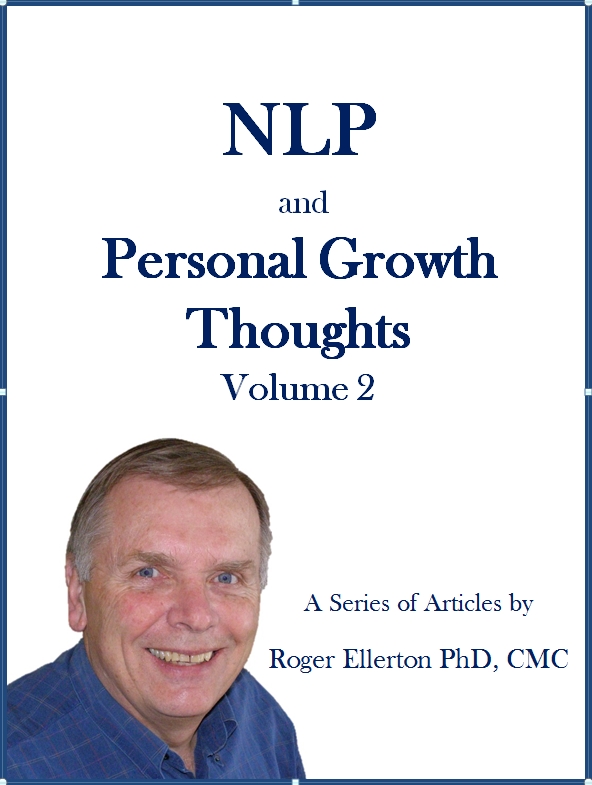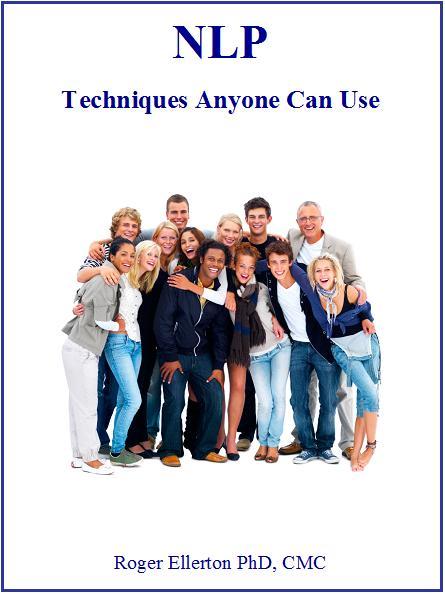NLP Logical Levels, Part II
By Roger Ellerton Phd, ISP, CMC, Renewal Technologies Inc.
This article may not be republished without written permission from Roger Ellerton/Renewal Technologies Inc. If you republish this article without permission, you will be in violation of copyright law and sent an invoice. You may share this and other pages with your friends by linking directly to this page from your website or blog.
NLP Logical Levels, Part I, describes the six levels: Spirituality/Purpose, Identity/Mission, Beliefs and Values, Capabilities/Strategies, Behaviours and Environment. In this article, we present other ways to look at the logical levels and an exercise to assist you with achieving personal congruence - all of the levels are in alignment.
Getting to Know Another Person
An important aspect of the NLP Logical Levels is that you can only observe two of the logical levels of another person - behaviour and environment. You can observe what they are doing and when, where and with whom. This will give you some idea as to their capabilities/strategies, beliefs and values, etc. To really be sure, you need to engage them in a conversation on these subjects. Having conversations with another person at the higher logical levels provides you with a more intimate understanding of that person and why they behave the way they do. How often do you have a conversation with someone you really care about and the topic is the weather (environment) or what they are doing (behaviour) rather than who they see themselves being (identity/mission) or what are their beliefs and values. And to engage in this type of conversation, you need to create a space where each of you feels safe in disclosing your 'inner selves'.
Teaching/Training
A number of years ago, I was an Associate Professor of Statistics at the University of New Brunswick. The Faculty of Nursing required all of its students to take a statistics course in their last year, first term. Over the years, this course had developed a bad reputation, mainly because it was taught by professors who approached it as a 'mathematics class'. As you may expect, most of the nursing students had difficulty with the course. Every year there would be a line-up of students outside of the Dean's office complaining about the course and asking for help.
Then it was my turn to teach this class!
Before proceeding, let's have a look at this situation through the lens of the NLP Logical Levels.
Nursing Students:
Spirituality/Purpose (connection to a larger system): Make a significant contribution to the community of people who require medical assistance, support or comforting.
Identity/Mission: A highly trained medical professional who can assist people in their time of need.
Beliefs and Values: He/she has the nursing skills and abilities to assist others. Another important belief held by many of the nursing students
is that they can not do mathematics (Before the class started, a number of nursing students met me in my office, expressing concern for the class and stating that they could not do mathematics and this is why they dropped the subject in high school.)
Capabilities/Strategies: Many positive capabilities/strategies for nursing. Less than supportive (in some cases dysfunctional) capabilities/strategies for mathematics.
Behaviours: The behaviours of a competent medical professional when working in a nursing environment. Distressed behaviours when asked to perform in a 'mathematics environment' - in some cases, almost paralyzed with inaction or breaking into tears.
Environment: A nursing environment or a mathematics environment.
My approach to this course: I went to the university library and in the medical journals found many medical examples that used statistics. I used these examples for classroom discussion and homework exercises. In effect, I changed the course from a statistics (mathematics) course to a nursing course. I had a great time and the students had an absolutely wonderful time. In the second term as part of their honours project, a number of the nursing students undertook projects that had a significant statistical component - community health survey of the Province of New Brunswick.
From a logical levels point of view, can you see why my approach was successful and that of the other professors was not?
Could you use a similar approach with your family, staff or co-workers that would allow them to see the situation differently and to draw on their strengths to overcome a perceived obstacle?
Aligning Logical Levels for Personal Congruence
For many of us, the logical levels operate outside of our conscious awareness. Whether we are aware of them or not, they have a significant influence over the quality of our lives.
The following exercise will help you to: 1. Become consciously aware of what factors influence how you live your life. 2. Identify possible conflicts. 3. Recognize possible changes you can make to bring the levels more in alignment and hence achieve a higher level of personal congruence (reduced inner conflict). I suggest you take your time doing this exercise and write down your answers.
Spirituality/Purpose: For the larger system (i.e. family, co-workers, people needing your service/product, community, ... ), what is your purpose or the impact you wish to have?
Identity/Mission: Who are you or what role do you play? Is the role necessary to achieve your purpose? What do you need to change?
Beliefs and Values: What beliefs do you have about yourself, about others, about the world in general? Do these beliefs support you in fulfilling your role? What do you value - in yourself, others, the world in general. Are these values in alignment with your role? Are there other beliefs and values
that you could take on that would be more in alignment?
Capabilities/Strategies: What capabilities/strategies/action plans do you have? Do you need to develop new capabilities, strategies or action plans? Are they in alignment with each of the above logical levels? If not, what needs to be changed? Maybe you need to change your capabilities
(get more training), your strategies or action plans. Or maybe, given this new information, you need to reassess your purpose, your role or your beliefs and values.
Behaviours: What do people really see/experience in your behaviours. Are your behaviours in alignment with each of the above logical levels? Does something need to be changed?
Environment: When, where, with whom do you do these behaviours? Are they in alignment with the above logical levels?
Aligning Your Goals with Your Logical Levels
Many of our goals (career, family, romance, health, purpose in life, ... .) are based on the requests, desires or expectations of others - parents, spouse, teachers, religious leaders, boss, society, ... . These are not our goals and hence do not have the energy that propels us forward to truly achieve our goals. When we struggle with our goals, almost always there is some hidden inner conflict that must be resolved. Often we are less than fully alive because of these inner conflicts. The following exercise will assist you in identifying these conflicts and realigning your goal with who you really are.
Think about your goal and answer the same questions for the logical levels as you did above. Notice if there is an alignment between the answers. For example you may find that achieving your goal would take time away from being with your spouse and children (assuming this is an important value for you). If this is the case, is there some way to adjust your goal or your strategies/action plan to spend time with your family and still achieve your goal? You may wish to ask those affected by your goal, as they often come up with solutions that you would never think of.
This process will allow you to become aware of the alignment (or lack of it) between your inner self and your goals. As you fine-tune your goals and align them with your inner self, you should find that your goals become clearer, more compelling and more easily achieved.
And NLP is Much more than that!
Author: Roger Ellerton is a certified NLP trainer, certified management consultant and the founder and managing partner of Renewal Technologies. The above article is based on his book Live Your Dreams Let Reality Catch Up: NLP and Common Sense for Coaches, Managers and You.
Copyright © 2003, Renewal Technologies Inc. All rights reserved.








